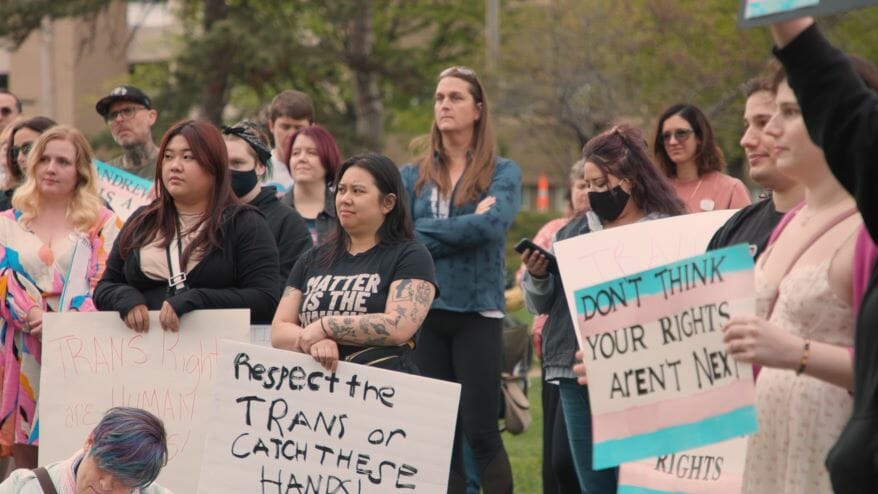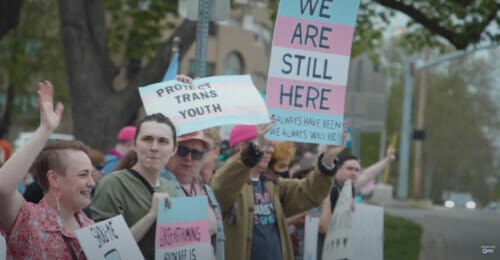Pondering KC’s Quest to Become a Transgender ‘Safe Haven’ Limits of Resolutions
Published June 14th, 2023 at 5:14 PM
Above image credit: Amid attacks from legislators and state officials in both Kansas and Missouri, folks in Kansas City protest the rights of transgender and gender non-binary folks to access care. (Cody Boston | Flatland)Can Kansas City become a true “safe haven” for transgender people?
After the Missouri General Assembly passed a wave of anti-trans bills, clashing with Kansas City’s more progressive political culture, what do these bills mean for transgender Kansas Citians?
What happened when Kansas City embraced progressive movements in the past? Should transgender Kansas Citians be worried, despite their city’s strong stance?
Missouri lawmakers on May 10 passed Senate Bill 49, which prohibits gender-affirming care to minors and those on Medicaid, and Senate Bill 39, which prohibits transgender kids from taking part in sports consistent with their gender identity.
One day after those bills were passed, the Kansas City Council approved a resolution declaring Kansas City as a Safe Haven for Transgender Residence, highlighting its position as a blue dot on the state’s political map.
On June 7, Missouri Gov. Mike Parson signed the state bills into law – solidifying his stance on transgender people.
After Aug. 28, the laws’ effective date, transgender Missourians will have a harder time accessing care, and if schools allow transgender kids to take part in sports consistent with their gender identity, they could lose all funding from the state.
Senate Bill 49, “Missouri Save Adolescents from Experimentation (SAFE) Act,” declares that no health care provider will be allowed to “perform gender transition surgeries, prescribe or administer cross-sex hormones or puberty-blocking drugs to a minor for a gender transition unless such minor was receiving such treatment prior to August 28, 2023.”
If health care providers continue to give gender-affirming treatment, they could have their medical license taken and face legal action from the state.
While Senate Bill 49 seeks to prevent minors from receiving care, it will have an impact on transgender adults, too. The bill states that MO HealthNet, Missouri’s Medicaid, will no longer cover gender-affirming care, making Missouri one of the nine states to deny gender-affirming care to all ages.
Kansas City Reacts
Ryan Cox, a psychologist in Kansas City who works with transgender adults, told the Kansas City Star that about 20% of his patients are on Medicaid. Considering that transgender people have the highest rate of poverty compared to other sexualities, the burden will fall most heavily on the transgender community.
Daniel Harig, in public testimony to the City Council before the vote on the resolution, wrote: “The recent political situation has delayed my top surgery (add) multiple times and has now canceled it. The top surgery I wanted to get at 18 was one of the things that kept me from going back to the psychiatric ward.”
“The fact that I, an adult, am NOW and could FURTHER be prevented from care that has kept me in a safe situation is not only dangerous to me but to the many others who keep hope in their lives because of transition,” Harig testified.

In support of Haring and many others, the city passed the resolution. The resolution directs city personnel to make enforcing these laws their “lowest priority,” essentially ignoring the laws.
“The city’s resolution basically says, ‘We’re not going to comply with this statute,” said Dan Margolies, a recently retired legal affairs journalist in Kansas City. He called it “a middle finger to the legislature.”
Benjamin Grin, chief medical officer for Kansas City, said that a resolution is the strongest legal action the city can currently take.
In general, cities can enact resolutions and ordinances that are contrary to their state’s laws. A resolution is more of a statement of intent, and an ordinance is a more permanent rule. An ordinance has the force of law, but since the Kansas City Police Department (KCPD) is run by the state and not the city, Kansas City can’t enact an ordinance.
Legal Limits
Councilwoman Andrea Bough, a sponsor of the resolution, acknowledged that some may be concerned that the resolution doesn’t “go far enough and simply be symbolic.”
“We will continue conversations with our partners to encourage that similar policies are enacted throughout the region,” Bough said. “But with the limitations on our abilities with respect to creation of policy within the police department, and the enforcement and prosecution of state laws, we believe we have gone as far as we can in the power as a constitutional charter city.”
Police Chief Stacey Graves has contended that the city resolution is outside the police department’s jurisdiction because its provisions “do not pertain to criminal conduct, but rather seeks enforcement through medical licensing and civil action.”
In response to Graves’s statement, Missouri Attorney General Andrew Bailey said, “As Missouri’s top legal officer, I will take any legal action necessary against the City to ensure our state laws are enforced.”
Margolies, for one, expects the conflict to continue.
“You’re talking about a Republican-controlled legislature that has already proven it can retaliate against the Democratic city,” Margolies said. “There are all kinds of measures they could take. I’d say those measures would not be found legal or constitutional if they were taken to court. But they could withdraw funding for certain programs, constrict funding, condition funding, there are all kinds of measures.”
History of Retaliation
The hierarchy of law goes federal, state then city. A state can prevent a city law from being enforced and the federal law can preempt them both. In fact, Missouri has preempted progressive Kansas City and St. Louis measures in the past.
In 2017, Kansas City voted to raise the minimum wage in the city to $15 an hour, and St. Louis voted to raise its minimum wage to $10 an hour in 2017, and $11 an hour in 2018. The measure was nullified by Missouri in House Bill 1194 four days later, which set the statewide minimum wage at $7.70 an hour.
More recently, there have been tensions between the state and the city over a 5 percentage point increase in KCPD’s budget, requiring the city to fund the police with 25% instead of 20% of their general revenue. The vast majority of states give control over the police to cities, but Missouri does not.
In 2012, St. Louis voters voted for the city to have control over their own police, something that is currently being challenged by the Missouri government. In March 2023, the Missouri House passed a bill that would bring St. Louis’s police department back under state control.
Kansas City Mayor Quinton Lucas said he isn’t worried about Missouri retaliating against the safe haven resolution.
“The reason I am not is because, first of all, I think it’s the right thing to do,” Lucas said. “Beyond that, they threaten to retaliate on everything. DEI (diversity, equity and inclusion), police issues, everything under the sun.”
Kansas City has a long history of being inclusive. In the early 1990s, Kansas City passed an ordinance that outlawed discrimination in employment, housing, or public accommodations based on someone’s sexual orientation or HIV status.
Lawrence, Kansas, is closely following Kansas City’s footsteps. After Kansas enacted Senate Bill 180, defining “male” and “female” as only what is assigned at birth, activists are calling on the city of Lawrence to not enforce the bill.
“At a certain point you have to stand up for what’s right, and what you think can make a difference long term,” Lucas said. “I’m not worried that us saying we’re going to be humane and generous is putting us in harm’s way.”
Grace Hills is a University of Kansas journalism student and summer intern at Kansas City PBS.




